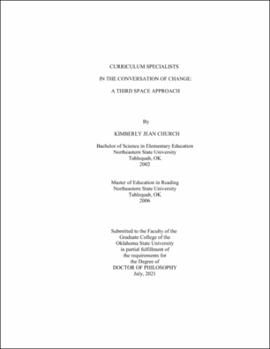| dc.contributor.advisor | Wang, Hongyu | |
| dc.contributor.author | Church, Kimberly Jean | |
| dc.date.accessioned | 2022-01-09T19:44:17Z | |
| dc.date.available | 2022-01-09T19:44:17Z | |
| dc.date.issued | 2021-07 | |
| dc.identifier.uri | https://hdl.handle.net/11244/333662 | |
| dc.description.abstract | The site-based curriculum specialist is a position that is often implemented to satisfy reform mandates without deeper, more significant consideration of how the specialist initiates or sustains change efforts in the school. Much of the current research focuses on the effects of the specialist's work in schools, but little attention is paid to the daily work - particularly the differences, tensions, and negotiations - involved in changing perceptions and practices of teachers, principals, and other staff members in wide-scale curriculum change efforts. This narrative inquiry research study uses third space theory to shed light on the daily life of curriculum specialists, the challenges they face in negotiating their roles and identities, and how they work with these challenges to create the space necessary to engage school staff in curriculum conversations of change. Data collection included individual interviews, observations, and a focus group interview with six-participants. Data analysis was conducted first through a narrative inquiry lens in which participants' stories are shared from their perspective as they perceive themselves as curriculum specialists and find meaning in their work. These stories were also situated in the social, cultural, and political context within which this work is carried out. A second layer of analysis used third space theory to reveal insights for (re)negotiating one's identity in the role, border crossing as a means to disrupt binaries present in one's work, as well as the transformative possibilities of hybridity. | |
| dc.description.abstract | The findings of this study reveal that the successful negotiation of the curriculum specialists' roles and identities, and the challenges they face, is dependent upon the specialist's willingness and ability to (re)orient her identity to the contextual factors within which she finds herself, as well as the acceptance of the position and readiness for change within the school's culture. There are four major implications for future practice, including the need for: clarifying policies related to the role, preparing curriculum specialists for the complexities of the position, building a culture primed for change, and ongoing professional learning in communities of support. | |
| dc.format | application/pdf | |
| dc.language | en_US | |
| dc.rights | Copyright is held by the author who has granted the Oklahoma State University Library the non-exclusive right to share this material in its institutional repository. Contact Digital Library Services at lib-dls@okstate.edu or 405-744-9161 for the permission policy on the use, reproduction or distribution of this material. | |
| dc.title | Curriculum specialists in the conversation of change: A third space approach | |
| dc.contributor.committeeMember | Smythe, Jon | |
| dc.contributor.committeeMember | Witte, Shelbie | |
| dc.contributor.committeeMember | Harris, Edward | |
| osu.filename | Church_okstate_0664D_17241.pdf | |
| osu.accesstype | Open Access | |
| dc.type.genre | Dissertation | |
| dc.type.material | Text | |
| dc.subject.keywords | curriculum change | |
| dc.subject.keywords | education | |
| dc.subject.keywords | site-based curriculum specialist | |
| dc.subject.keywords | third space | |
| thesis.degree.discipline | Education | |
| thesis.degree.grantor | Oklahoma State University | |
